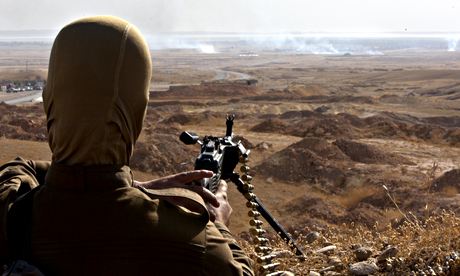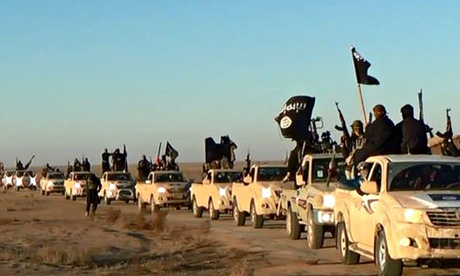How an arrest in Iraq revealed Isis's $2bn jihadist network
Author(s): Martin Chulov in Baghdad
Source: The Guardian. Article date: June 15th, 2014
 Members of the Kurdish armed fighting force look out over Jalula in northern Iraq, where they have been fighting ISIS. (Photograph: Rick Findler)
Members of the Kurdish armed fighting force look out over Jalula in northern Iraq, where they have been fighting ISIS. (Photograph: Rick Findler)
 ISIS fighters, pictured on a militant website verified by AP. ISIS fighters, pictured on a militant website verified by AP.
ISIS fighters, pictured on a militant website verified by AP. ISIS fighters, pictured on a militant website verified by AP.
(Photograph: AP)
Source: The Guardian. Article date: June 15th, 2014
 Members of the Kurdish armed fighting force look out over Jalula in northern Iraq, where they have been fighting ISIS. (Photograph: Rick Findler)
Members of the Kurdish armed fighting force look out over Jalula in northern Iraq, where they have been fighting ISIS. (Photograph: Rick Findler)
Two days before Mosul fell to the Islamic insurgent group Isis (the Islamic State in Iraq and the Levant), Iraqi commanders stood eyeballing its most trusted messenger. The man, known within the extremist group as Abu Hajjar, had finally cracked after a fortnight of interrogation and given up the head ISIS's military council.
“He said to us, you don't realise what you have done',” an intelligence official recalled. “Then he said: 'Mosul will be an inferno this week'.”
Several hours later, the man he had served as a courier and been attempting to protect, Abdulrahman al-Bilawi, lay dead in his hideout near Mosul. From the home of the dead man and the captive, Iraqi forces hoovered up more than 160 computer flash sticks which contained the most detailed information yet known about the terror group.
The treasure trove included names and noms de guerre of all foreign fighters, senior leaders and their code words, initials of sources inside ministries and full accounts of the group's finances.
“We were all amazed and so were the Americans,” a senior intelligence official told the Guardian. “None of us had known most of this information.”
Officials, including CIA officers, were still decrypting and analysing the flash sticks when Abu Hajjar's prophecy was realised. Isis swept through much of northern and central Iraq over three stunning days, seizing control of Mosul and Tikrit and threatening Kirkuk as three divisions of the Iraqi army shed their uniforms and fled.
The capitulation of the military and the rapid advances of the insurgents have dramatically changed the balance of power in Iraq, crippled prime minister Nouri al-Maliki, allowed Kurdish forces to seize control of the disputed city of Kirkuk and galvanised a Shia fightback along sectarian lines, posing a serious threat to the region's fragile geopolitics. On Sunday ISIS published photographs that appeared to show it capturing and killing dozens of Iraqi soldiers.
“By the end of the week, we soon realised that we had to do some accounting for them,” said the official flippantly. “Before Mosul, their total cash and assets were $875m [£515m]. Afterwards, with the money they robbed from banks and the value of the military supplies they looted, they could add another $1.5bn to that.”
 ISIS fighters, pictured on a militant website verified by AP. ISIS fighters, pictured on a militant website verified by AP.
ISIS fighters, pictured on a militant website verified by AP. ISIS fighters, pictured on a militant website verified by AP.(Photograph: AP)
Laid bare were a series of staggering numbers that would be the pride of any major enterprise, let alone an organisation that was a startup three years ago.
The group's leaders had been meticulously chosen. Many of those who reported to the top tier – all battle-hardened veterans of the insurgency against US forces nearly a decade ago – did not know the names of their colleagues. The strategic acumen of ISIS was impressive – so too its attention to detail. “They had itemised everything,” the source said. “Down to the smallest detail.”
Over the past year, foreign intelligence officials had learned that ISIS secured massive cashflows from the oilfields of eastern Syria, which it had commandeered in late 2012, and some of which it had sold back to the Syrian regime. It was also known to have reaped windfalls from smuggling all manner of raw materials pillaged from the crumbling state, as well as priceless antiquities from archaeological digs.
But here before them in extraordinary detail were accounts that would have breezed past forensic accountants, giving a full reckoning of a war effort. It soon became clear that in less than three years, ISIS had grown from a ragtag band of extremists to perhaps the most cash-rich and capable terror group in the world.
“They had taken $36m from al-Nabuk alone [an area in the Qalamoun mountains west of Damascus]. The antiquities there are up to 8,000 years old,” the intelligence official said. “Before this, the western officials had been asking us where they had gotten some of their money from, $50,000 here, or $20,000 there. It was peanuts. Now they know and we know. They had done this all themselves. There was no state actor at all behind them, which we had long known. They don't need one.”
The scale of ISIS's resources seems to have prepared it for the improbable. But even by its ruthless standards, occupying two major cities in Iraq in three days, holding on to parts of Falluja and Ramadi, and menacing Kirkuk and Samara, was quite an accomplishment.
Social media postings throughout last week revealed the group's shock at its successes. Some posting showed extremists weeping with joy as dozens of Iraqi army humvess were driven through a sand berm on the border into Syria.
Foreign jihadists, many from Europe, were among those who stormed into Mosul and have spread through central Iraq ever since. Most of their names were already known to the intelligence agencies which had tried to track their movements after they arrived in Turkey, then disappeared, initially across the Syrian border. But noms de guerre given to the new arrivals had left their trails cold. Now officials had details of next of kin, and often phone numbers and emails.
Whether the intelligence haul can do much to reel in ISIS after the fact seems a moot point, with the group having already wrought so much carnage in such a short time. “We will eventually find them,” said the Iraqi official. “We knew they had infiltrated the ministries and the most frustrating thing about that flash [stick] was it only had initials. We are focusing on the initials that had the annotation 'valuable' next to them.”
Other names were clearly of lesser use, he said. They were marked with “lazy”, “undecided” or “needs monitoring”.
More than ever before is now known about how ISIS has gathered steam. The past week has also been an advanced education in its capabilities and ambitions. “Now we have to catch up with them,” the official said.
No comments:
Post a Comment
Thanks for commenting. Your comments are needed for helping to improve the discussion.